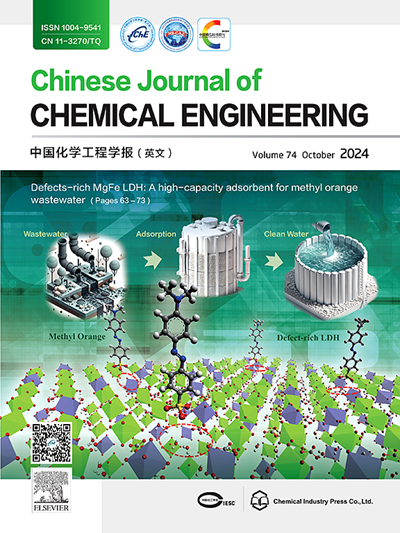A model free adaptive control method based on self-adjusting PID algorithm in pH neutralization process
IF 3.7
3区 工程技术
Q2 ENGINEERING, CHEMICAL
引用次数: 0
Abstract
In this paper, a new model free adaptive control method based on self-adjusting PID algorithm (MFAC-SA-PID) is proposed to solve the problem that the pH process with strong nonlinearity is difficult to control near the neutralization point. The MFAC-SA-PID method also solves the problem that the parameters of the model free adaptive control (MFAC) method are not easy to be adjusted and the effect is not obvious by introducing a fuzzy self-adjusting algorithm to adjust the controller parameters. Then the convergence and stability of the MFAC-SA-PID method are proved in this paper. In the simulation study, the control performance of the MFAC-SA-PID method proposed in this paper is compared with the traditional MFAC method and the improved model free adaptive control (IMFAC) method, respectively. The results show that the proposed MFAC-SA-PID method has better control effect on the pH neutralization process. The MFAC-SA-PID control performance also outperforms the traditional MFAC method and IMFAC method when step input disturbances are added, which indicates that the MFAC-SA-PID method has better robustness and stability.

一种基于自调节PID算法的pH中和过程无模型自适应控制方法
针对pH过程在中和点附近具有较强非线性难以控制的问题,提出了一种基于自整定PID算法的无模型自适应控制方法(mfacc - sa -PID)。MFAC- sa - pid方法通过引入模糊自整定算法对控制器参数进行整定,解决了无模型自适应控制(MFAC)方法参数不易调整、效果不明显的问题。然后证明了MFAC-SA-PID方法的收敛性和稳定性。在仿真研究中,将本文提出的MFAC- sa - pid方法的控制性能分别与传统的MFAC方法和改进的无模型自适应控制(IMFAC)方法进行了比较。结果表明,MFAC-SA-PID方法对pH中和过程具有较好的控制效果。在加入阶进输入扰动时,MFAC- sa - pid的控制性能也优于传统的MFAC方法和IMFAC方法,这表明MFAC- sa - pid方法具有更好的鲁棒性和稳定性。
本文章由计算机程序翻译,如有差异,请以英文原文为准。
求助全文
约1分钟内获得全文
求助全文
来源期刊

Chinese Journal of Chemical Engineering
工程技术-工程:化工
CiteScore
6.60
自引率
5.30%
发文量
4309
审稿时长
31 days
期刊介绍:
The Chinese Journal of Chemical Engineering (Monthly, started in 1982) is the official journal of the Chemical Industry and Engineering Society of China and published by the Chemical Industry Press Co. Ltd. The aim of the journal is to develop the international exchange of scientific and technical information in the field of chemical engineering. It publishes original research papers that cover the major advancements and achievements in chemical engineering in China as well as some articles from overseas contributors.
The topics of journal include chemical engineering, chemical technology, biochemical engineering, energy and environmental engineering and other relevant fields. Papers are published on the basis of their relevance to theoretical research, practical application or potential uses in the industry as Research Papers, Communications, Reviews and Perspectives. Prominent domestic and overseas chemical experts and scholars have been invited to form an International Advisory Board and the Editorial Committee. It enjoys recognition among Chinese academia and industry as a reliable source of information of what is going on in chemical engineering research, both domestic and abroad.
 求助内容:
求助内容: 应助结果提醒方式:
应助结果提醒方式:


